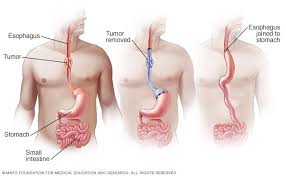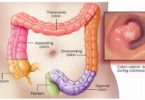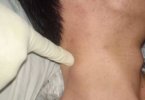What's in this article?
Esophageal cancer is cancer that occurs in the esophagus a long, hollow tube that runs from your throat to your stomach. Your esophagus carries food you swallow to your stomach to be digested.
Esophageal cancer usually begins in the cells that line the inside of the esophagus. Esophageal cancer can occur anywhere along the esophagus, but in people in the United States, it occurs most often in the lower portion of the esophagus. More men than women get esophageal cancer.
Esophageal cancer isn’t common in the United States. In other areas of the world, such as Asia and parts of Africa, esophageal cancer is much more common.
Esophageal cancer facts
- The esophagus in adults is a muscular tube about 10 inches long that helps move food from the mouth to the stomach. It is composed of a mucosal lining, submucosa, muscle tissue and an outer covering layer of cells called the adventitia above the diaphragm and the serosa below the diaphragm.
- Cancer cells are malignant forms of body cells that often grow to form tissue masses or tumors that can spread to other organs.
- The two main types of esophageal cancer are adenocarcinomas and squamous cell carcinomas.
- Risk factors for both types are age 65 or greater, male sex, smoking, heavy drinking, a diet poor in fruits and vegetables, obesity, acid reflux, and Barrett’s esophagus.
- Common symptoms of esophageal cancer include food getting stuck in the esophagus and vomiting, pain with swallowing, chest and/or back pain, heartburn, weight loss, and a hoarse voice.
- Diagnosis is performed by a barium swallow test, endoscopy, and biopsy (definitive test).
- There are five stages of esophageal cancer (stages 0 to IV), with 0 being the least invasive and IV the most aggressive with spread to distant organs.
- Treatment of this cancer is individually based on the patient’s health and cancer stage; the options vary from surgery, chemotherapy, radiation or a combination of these options (also, some patients may be considered for laser or photodynamic therapy
- Surgery for this cancer may involve part or all of the esophagus; other structures (part of the stomach,lymph nodes or other parts of affected organs may be removed).
- Radiation therapy uses high energy rays focused to kill cancer cells; it is often used together with chemotherapy.
- Chemotherapy uses drugs to destroy cancer cells; it is often used together with radiation and/or surgery and often requires cycles or repeated doses of drugs.
- In general, patients are encouraged to get a second opinion about their diagnosis and treatment for esophageal cancer.
- Side effects of treatment for esophageal cancer may include the need for supportive care to control pain, infections such as pneumonia, difficulty in swallowing, depression, nausea, vomiting, requiring a feeding tube, requiring a special diet, weight loss, and may need vitamin and mineral supplements
- Follow-up care for monitoring and or additional treatments is usually required.
- Supportive care can be provided for esophageal cancer patients; this should be done by the patient’s treatment team, as well as by social workers, counselors, clergy, and many others.
- Research about esophageal cancer is ongoing; the treating doctors may be able to link patients to other researchers that are doing clinical trials of the newest treatments for this cancer.
- The National Cancer Institute (NCI) offers an extensive amount of information about cancers, including esophageal cancer (1-800-422-6237) and through their PDQ web site.
What Are the Symptoms of Esophageal Cancer?
Early on there may be no symptoms. In more advanced cancers, symptoms of esophageal cancer include:
- Difficulty or pain when swallowing
- Weight loss
- Pain in the chest, behind the breastbone
- Coughing
- Hoarseness
- Indigestion and heartburn
What Are Risk Factors for Esophageal Cancer?
There are a number of factors which increase a person’s risk of developing esophageal cancer. They include:
- Gastroesophageal reflux disease (GERD), in which contents and acid from the stomach back up into the esophagus, significantly increase the risk of adenocarcinoma of the esophagus.
- Smoking or other use of tobacco.
- Heavy alcohol use.
- Barrett’s esophagus, a condition that affects the lower part of the esophagus and can lead to esophageal cancer. Barrett’s esophagus may be caused by GERD. Over time, stomach acid in the esophagus can cause changes in the cells that increase risk for adenocarcinoma.
In addition, certain groups men and the elderly are at greater risk for esophageal cancer. Risk of adenocarcinoma of the esophagus is higher in white men but squamous cell carcinoma of the esophagus is more common in Asian men and men of color.
How Is Esophageal Cancer Diagnosed?
To diagnose esophageal cancer, your doctor will review your symptoms, medical history, and examine you. In addition, he or she may order certain blood tests and X-rays.
Treatment for Esophageal Cancer
The approach to treatment is individualized to each patient’s situation. Recommended treatments depend on the stage and health of the patient.
Esophageal cancer is often found in older patients who have other underlying illnesses which complicates treatment. Esophageal cancer is often diagnosed late in the course of the disease because symptoms often occur only after a tumor has grown and potentially spread. Most often, if the patient can tolerate it, treatment consists of a combination of chemotherapy, radiation therapy, and surgery.
Surgery
The surgical procedure for esophageal cancer is removal of the esophagus (Esophagectomy = esophagus + ectomy = removal). This is often recommended for patients with stage II or III cancer. Those with stage IV cancer may not be surgical candidates because of poor prognosis. Certain patients may not be appropriate candidates for surgery because the cancer has spread to adjacent structures like the heart or lung. Some patients may not be candidates for surgery because of underlying medical illnesses, such as advanced heart or lung disease or diabetes that would increase the risk of death during or shortly after surgery.
Chemotherapy and radiation
Chemotherapy and radiation therapy may be administered prior to surgery to help shrink the tumor. There are a variety of chemotherapy protocols that may be considered but at present they are being used off label and are not FDA approved. Surgery is often delayed for 4 to 6 weeks to allow the chemotherapy and radiation to be administered.
Targeted therapy
There are specific genes that are associated with esophageal cancer. In certain circumstances, the tumor can be tested to see whether genes like HER2 are present. Targeted medications can attach or bind to different protein sites on the tumor cells and inhibit tumor growth. This is not chemotherapy which tries to kill tumor cells (and normal ones as a side effect), but rather a potential adjunct.
Endoscopic treatments
If the esophageal cancer is confined the walls of the esophagus with no spread to the lymph nodes or distant organs (stage I), surgical removal of the tumor may be accomplished via endoscopic procedure.





